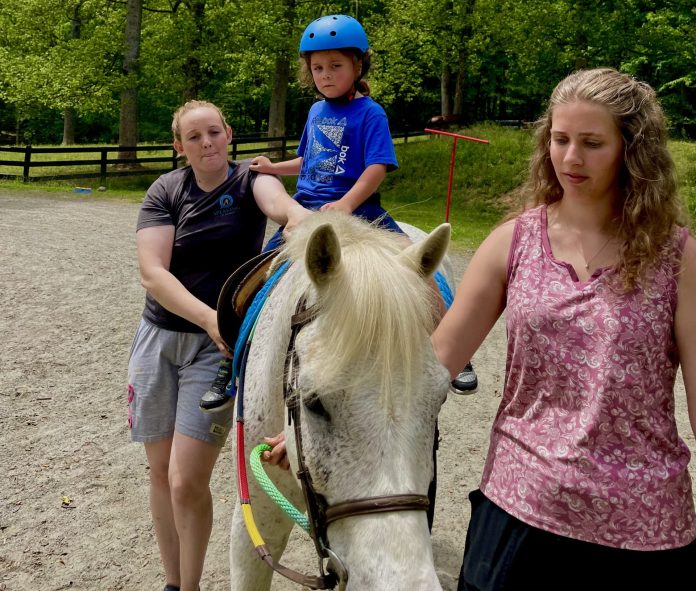
By ADA HAENSEL, M.Ed
In our word-focused world, we often forget that communication extends beyond speech. At Speaking of Horses, our equine therapists demonstrate that profound communication can happen in silence—and true listening involves more than hearing words.
Nature’s Nonverbal Experts
Horses, as prey animals evolved on open grasslands, communicate almost entirely through body positioning, facial expressions, energy, touch, and occasional vocalizations. This sophisticated nonverbal system allows them to coordinate movements, establish social hierarchies, express needs, and maintain safety without speaking.
Their listening involves their entire being:
- Eyes scanning for tiny changes in posture
- Ears constantly rotating to track sounds
- Skin feeling shifts in air pressure
- Nose gathering chemical information about emotions
- Nervous system attuned to energy shifts
Authentic Communication
Perhaps the most profound lesson horses offer is their insistence on authenticity. They respond not to our words or conscious intentions, but to our embodied truth—our actual internal states. A nervous rider pretending to be confident will find the horse responding to their nervousness, not their facade.
For children with communication challenges, this creates a uniquely supportive environment. Horses don’t judge or have expectations for how communication “should” happen—they simply respond honestly to what’s genuinely communicated.
Therapeutic Applications
Our therapy horses demonstrate extraordinary listening skills:
- Phil detects hidden emotional states, refusing to move until riders acknowledge their true feelings
- Blink naturally respects personal space boundaries with touch-sensitive clients
- Whinny matches his movement to riders’ internal rhythms, helping regulate their nervous systems
Lessons for Human Communication
From our equine partners, we learn to:
- Listen with our whole bodies, not just our ears
- Create safety through predictable responses
- Honor silence as meaningful communication
The ultimate gift horses offer children with communication challenges is being truly heard. When a horse responds appropriately to subtle communication attempts, children receive powerful feedback: “I hear you. You matter. Your communication works.”
This creates communicative confidence that transfers to human interactions. As one parent shared: “My son spent years in therapy being encouraged to use his words, but it always felt like he was performing speech. With the horses, he finally feels listened to—even when he’s not speaking.”
At Speaking of Horses, we’re not just teaching children to communicate—we’re learning from horses how to listen effectively. They show us that authentic presence matters more than technique, connection precedes communication, and understanding requires attunement beyond words.
The next time you interact with someone who struggles with traditional communication, try listening like a horse: with your whole body, without agenda, with respect for silence, and with attention to the many ways meaning can exist beyond words.
About Speaking of Horses
Speaking of Horses operates as a nonprofit organization dedicated to making equine-assisted speech therapy accessible to children from all backgrounds. While we accept insurance, including Medicaid, the costs of providing this specialized therapy far exceed typical reimbursement rates. The care and maintenance of our therapy horses, specialized adaptive equipment, facility upkeep, and accommodations like our sensory corner and mounting ramp all require resources beyond what insurance covers.
Our program is made possible through the generosity of donors and community supporters who understand the value of patience, connection, and meeting each child where they are. Consider supporting Speaking of Horses through a donation that helps create the time and space for more children to find their voices at their own perfect pace.
Your contribution directly supports the unhurried, child-led approach that makes these breakthroughs possible. To learn more about supporting our mission or to make a donation, please visit our website by clicking here or contact us directly.
This article originally appeared in the The Plaid Horse and is published here with permission.
There are more informative articles in our section on Health & Education.

































